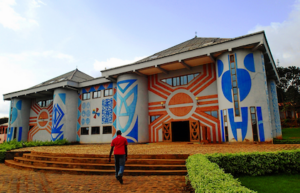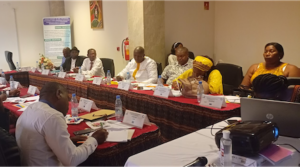What Capacity is Required to Access Finance for Locally-Led and Gender-Responsive Climate Change Adaptation Action at Sub-National Level in Cameroon?
Developing a Framework to Monitor, Evaluate and Learn as an Enabler of Adaptive Project Management
 Despite a significant increase in climate finance over the past decade, the majority of adaptation funding is still channeled through national governments. This often excludes city governments and the vulnerable communities they serve from the financing processes (Friis-Hansen et al. 2022; IIED 2021). International adaptation finance passes through numerous mechanisms and channels, from the international to the local level, and it often fails to reach the poor and marginalized communities who need it most (CPI reports and analyses, UNEP 2023). Moreover, there remains a lack of transparency in donor reporting regarding how much climate finance actually reaches the local level and involves community and participatory processes (Oxfam 2024).
Despite a significant increase in climate finance over the past decade, the majority of adaptation funding is still channeled through national governments. This often excludes city governments and the vulnerable communities they serve from the financing processes (Friis-Hansen et al. 2022; IIED 2021). International adaptation finance passes through numerous mechanisms and channels, from the international to the local level, and it often fails to reach the poor and marginalized communities who need it most (CPI reports and analyses, UNEP 2023). Moreover, there remains a lack of transparency in donor reporting regarding how much climate finance actually reaches the local level and involves community and participatory processes (Oxfam 2024).
Between 50% and 80% of the adaptation and mitigation actions necessary to tackle climate change will be implemented at the local level by subnational governments and partners. Therefore, it is crucial that these entities play a central role in addressing the climate crisis (OECD 2023). Adapting to climate change impacts requires substantial resources: an estimated USD 52.7 billion is needed annually between 2020 and 2030 for Africa to adapt to climate change (GCA 2022). However, in 2020, only USD 11.4 billion flowed to the continent, and the annual average investment for urban climate finance in Sub-Saharan Africa was only USD 3 billion (CPI 2022).
Knowledge brokering plays a critical role in addressing this gap by facilitating the flow of information between local communities, city governments, and financial institutions (Scodanibbio et al. 2022). By translating complex financial and adaptation concepts into actionable knowledge, brokers can empower local actors to access and utilize climate finance more effectively. This ensures that financial resources are directed to where they are needed most, fostering inclusive and effective climate adaptation efforts at the local level.
To address climate finance gaps at the local level, ICLEI Africa has dedicated the BRIDGE project (financed as part of the Step Change initiative) in Cameroon. This is well aligned with Cameroon’s National Adaptation Plan (2015-2035), which encompasses urban development and gender equality objectives. Nonetheless, many cities in Cameroon are reporting barriers to accessing training, resources and finance needed to fulfil lead local-level climate action planning and implementation. In this context, BRIDGE will build capacity with local NGOs and city officers to act as climate knowledge brokers, in order to unlock finance for locally-led adaptation that is gender-responsive. Together with the BRIDGE project team, PlanAdapt has developed the MEL framework and system for the BRIDGE project, based on our expertise in capacity building and knowledge brokering skills for climate adaptation.

Developing the MEL framework for BRIDGE encompasses reflecting on whose capacity, and capacity to do what. PlanAdapt proposed a qualitative approach to co-creating the definition of capacity building for knowledge brokering among project implementation partners and stakeholders. This approach allows for a local demand-driven process, ensuring that the capacity building is tailored to the specific needs and context of the local actors involved in climate resilience planning and implementation in Cameroon and the region. We designed a MEL system that serves both upward (donor accountability) and downward accountability (accountability to local stakeholders). By establishing distinct processes for accountability and learning, we can address the tension between these objectives and ensure that both are adequately met.
Moreover, the MEL framework was designed in order to support adaptive management and learning for the project implementation partners, donors and stakeholders. This approach allows for continuous improvement and responsiveness to changing conditions and insights gained during the project and from the different project stakeholders. We employed tools like Outcome Mapping and Outcome Harvesting to capture both foreseen and unforeseen changes. These tools help in documenting shifts in knowledge, skills, and attitudes identified as crucial for unlocking climate finance and enhancing the overall effectiveness of locally-led adaptation efforts. By focusing on these strategies, PlanAdapt aims to enhance the capacity of knowledge brokers and their networks to enable inclusive planning, project development, and financing for gender-responsive and locally-led climate change adaptation action. This approach not only builds local capacity but also ensures that MEL processes contribute to sustainable and impactful adaptation outcomes.
PlanAdapt continues to expand its expertise in decentralizing climate finance, driven by our Locally-Led Adaptation working group. We are also involved in other projects driving decentralized climate finance, such as:
